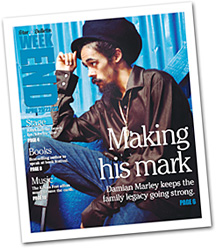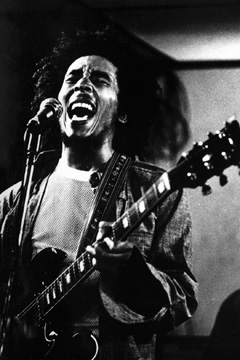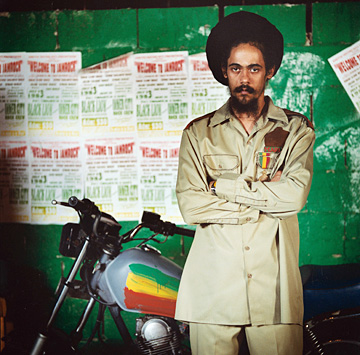 | ||||||||||||||||
|
|
OF ALL the Marley children, Damian has probably lived the most comfortably. The product of his father's extra-marital relationship with Miss World 1976 Cindy Breakspeare, he was born in Jamaica and raised in upper-class Stoney Hill. It's a far cry from Trenchtown, the Kingston ghetto where his father grew up. "I went to a good school and had a comfortable home," he said by phone from Australia last week. "At the same time, I was raised very level-headed, very down-to-earth in terms of being upper class but not really being spoiled."
"It was really, what you say, a cover band," he said. "We didn't have a lot of original material ... we (did) Mother's Day shows and, you know, private parties for teenage girls and stuff like that. Back in those days we were like 11, 12." The Shepherds were talented enough, in fact, to perform at the 1992 Sunsplash Festival, although they broke up soon after. Marley continued to perform with his brothers and sisters during high school, and released his solo debut in 1996. "When I started with 'Mr. Marley,' I didn't have any facial hair," he laughed. "You're talking about from when I was a little boy, really. I started (that album) when I was still in high school." His immaturity as an artist was evident. Critics panned the album as a lackluster effort by a son trying to ride the coattails of his famous dad. But it also got Marley the recording experience he needed, and the track "Me Name Junior Gong" garnered some credibility among dancehall fans. His sophomore release, "Halfway Tree," showed marked improvement, earning a Grammy for Best Reggae Album in 2002.
"I used to have cousins who come to Jamaica ... from America every summer, so they would bring down the latest hip-hop," he said. "So I was always familiar with hip-hop in terms of from Slick Rick coming up, that era coming up. "When Snoop Dogg came out is when I really started buying hip-hop music for myself. And of course, since then my love for it has grown." On "Jamrock," Marley uses samples of his father's music, reworking classic tracks like "Pimpa's Paradise" and "Exodus." He describes himself as a musical rebel, taking the traditional notion of what reggae is supposed to sound like and giving it a twist. "For example, that shot now ('Pimpa's Paradise'), we picked that one because you hear how everybody has the pimp cup and pimp juice, pimp this and that," Marley said. "So it's kind of relevant to the hip-hop world, you know?"
With more than a decade of musical experience to his credit, and the awards to back it up, Marley continues to uphold the family legacy. Just don't try to pin him down when it comes to the future. While his style of patois flows seamlessly with his hip-hop contemporaries, he won't allow his mindset to remain fixed in one style for too long. "We don't really premeditate too much, to tell you the truth," he said. "When it comes to making music, we kind of just do whatever is the vibe at the moment, you know?"
© Honolulu Star-Bulletin -- https://archives.starbulletin.com
| Tools
| ||||||||||||||
 | ||||||||||||||||







